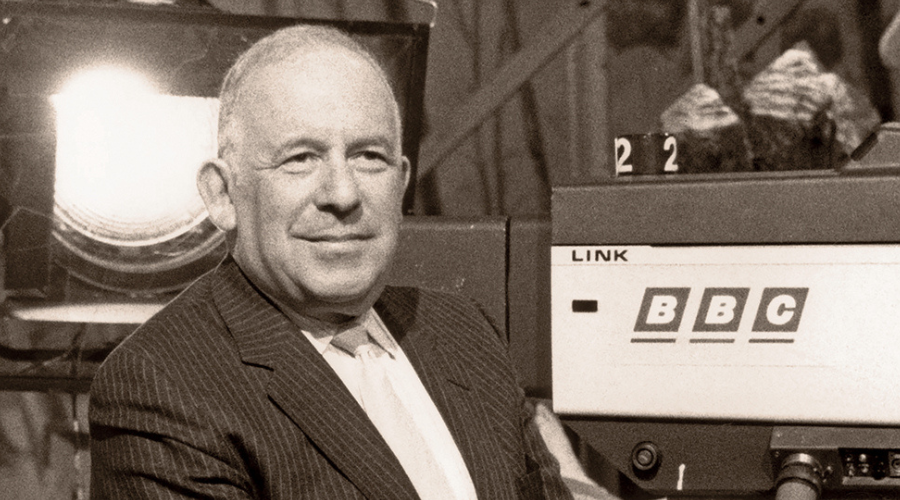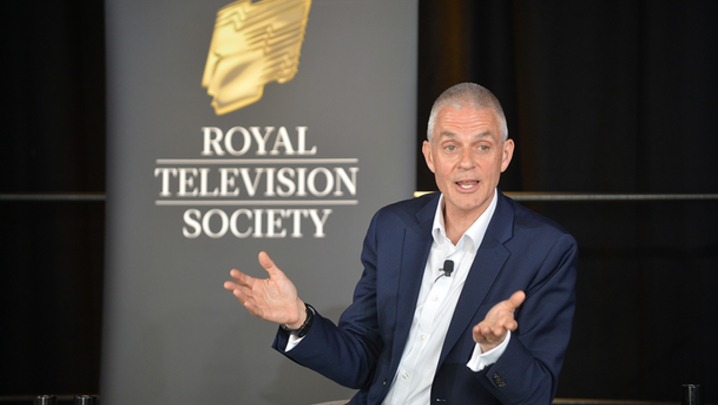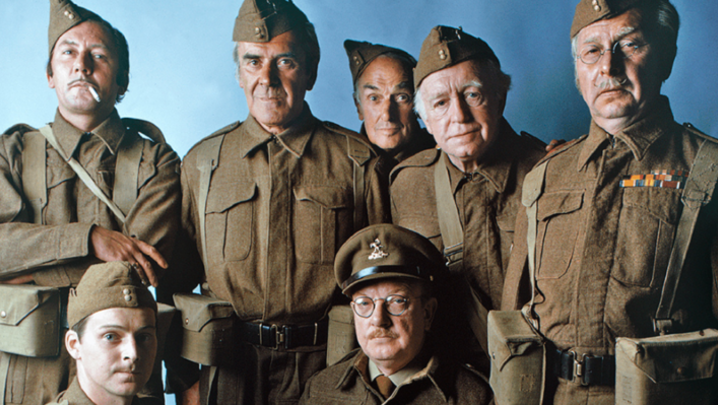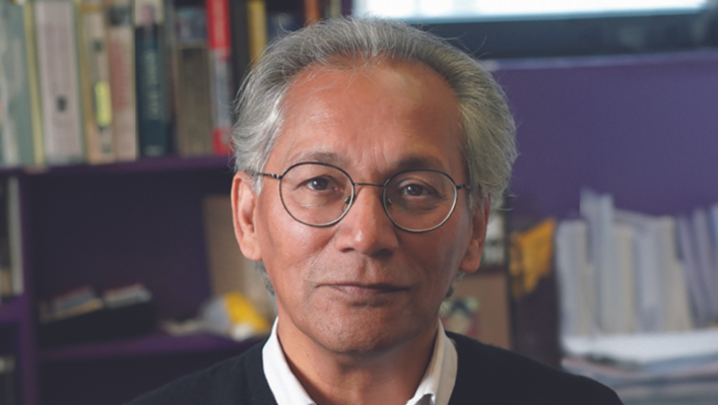Steve Clarke celebrates the life and achievements of one of the true legends of British broadcasting, who has died aged 98.
To have had one BBC career as distinguished as that of Sir Paul Fox would have been remarkable – Editor of Grandstand, Editor of Panorama and one of the most successful Controllers of BBC One ever (1967-73), who launched shows such as Dad’s Army, The Generation Game, The Two Ronnies and Parkinson. But to have had two – he left Television Centre in 1973 to put Yorkshire Television on the map, but returned in 1988 to become Managing Director of BBC Television – was, by any standards, an extraordinary achievement.
“Few people have had such a broad and lasting impact on the TV landscape, commissioning shows that audiences have loved for decades and still love,” BBC Director-General Tim Davie said. “He was one of the best TV executives from a golden era in television. He will be hugely missed.”
Paul was Chair of the RTS from 1985 to 1992.
That Paul had arrived in England as a refugee from Nazi Germany – having been put on the first Kindertransport as a 13-year-old by his aunt and uncle – and later served in the Second World War as a paratrooper made his life more incredible still.
“He rarely talked about that experience but, in later years, he did a little bit,” recalled Will Wyatt, who worked closely with Paul at the BBC. “He used to say: ‘I left Germany aged 13 as a Kindertransport and returned by parachute over the Rhine when I was 18.’”
Both his parents died before he was 15. His father killed himself when Paul was six; his mother was a victim of the Holocaust. Paul’s son, Jeremy, put it like this: “It always amazed us that he never talked about this but that’s because he never thought of himself as a Holocaust survivor.”
Paul was educated at Bournemouth Grammar School. He left his foster family when he was 16 to go to London to find a job and live in a boys’ hostel.
At 18, he joined the Parachute Regiment and was wounded in action – shot in the arm and leg while making a jump – with the 6th Airborne Division after the 1944 Rhine crossing.
His father had been a doctor but, on being demobbed, Paul went into journalism; he wrote more than 100 letters to newspapers, and his first job was as a reporter on the Kentish Times. He moved to The People and then worked in film at Pathé News in 1947.
On a weekend trip to a dance hall in London, he met his future wife, Betty, so he decided to stay in the capital.
He began his career at the BBC in 1950, doing holiday relief as a writer-producer on Television Newsreel, working at Alexandra Palace in north London. When, two years later, King George VI died unexpectedly, aged 56, the BBC was unprepared for the monarch’s death, so no obituary had been produced.
It was therefore decided to close down the Television Service, ostensibly out of respect for the dead King, but in fact to buy time to produce the obituary. Paul and a colleague worked through the night on an hour-long obituary, duly broadcast when the Television Service reopened the following evening.
“I remember Norman Collins, then Controller of BBC Television, came to look at it and said: ‘You have done a splendid job,’” Paul liked to recall. Always highly competitive, he relished the challenge of working against the clock to achieve outstanding results.
At the time, television was in its infancy and broadcast only during the afternoons and evenings to a limited number of homes in London and Birmingham. Paul would be one of its pioneers.
Even then, he used his considerable physical presence to help achieve his professional objectives; it was not unknown for him to bar the door to the editing suite with his body so that no one else could come in until the programme was completed to his satisfaction. Not for nothing was he known as “the rhino”.
“He was a tall man with a large head and a commanding presence who let you know what he thought about things,” said Wyatt, who added that, in addition to being combative, Paul was capable of great acts of kindness to colleagues and friends.
Sport was a passion, particularly Arsenal Football Club and horse racing. “He once confessed to me that he’d never been horse racing except in a box,” remembered Wyatt. In the 1950s, Paul edited TV’s first magazine programme, Sportsview, and invented Sports Personality of the Year.
Paul’s lack of a university education did not hold him back at the BBC, then, as now, run largely by Oxbridge graduates. His drive, talent and sheer force of personality stamped itself on an organisation still struggling to come to terms with the creative opportunities presented by television and the challenge of ITV.
Wyatt recalled: “The BBC was still reeling from the impact of ITV, which launched in 1955. A shock went through the system, which was still being felt years later, because the audience figures went from 100% down to about 25% within a matter of months.”
Paul was one of the executives who helped transform the fortunes of BBC Television. He was fortunate to work alongside the visionary Director-General Hugh Greene. “It is worth saying that, when Hugh Greene arrived as DG, the figures were 28% BBC, 72% ITV. That was in 1961,” Paul told the RTS in 2012. “A year later, they were 52% to 48%. In other words, the BBC got the majority.”
Wyatt said: “Paul was a decisive and competitive scheduler and commissioner. There were only two channels and he wanted to win.”
As well as entertainment hits such as The Generation Game, presented by Bruce Forsyth and now transmitted in colour, BBC One broadcast Match of the Day football, tennis from Wimbledon and extensive coverage of the 1972 Olympics from Munich. However, the Apollo 11 moon landing of 1969 was only broadcast in black and white.
In 1973, Paul jumped ship to join Yorkshire Television as Director of Programmes, doubling his BBC salary overnight. He thought the BBC would never appoint a Jewish man Director-General. “There are only three jobs worth having in the BBC: Editor of Panorama, Controller of BBC One and Director-General. I have had the first two and I would never have got the third,” he said not long after joining Yorkshire.
He would remain at the Leeds-based ITV company until 1988, rising to become Managing Director and turning the station into one of the ITV network’s powerhouses. “Paul ensured that Yorkshire punched above its weight, whether it was in current affairs, science programmes or comedy and drama,” recalled David Lowen, the RTS’s former Honorary Secretary, who worked with Paul as a news executive at YTV. “Because of Paul’s presence, we had a bigger say in the ITV network than we were entitled to because of our share of ITV advertising revenue.
“He could win battles around the network controllers’ table due to the force of his personality and the bulk of his bearing. Paul ensured that Yorkshire had to be taken seriously.”
The award-winning First Tuesday current affairs series and the comedies Rising Damp and A Bit of a Do were all network shows commissioned by YTV.
In 1988, Paul, aged 63, surprised the industry by accepting BBC DG Michael Checkland’s offer to return to the corporation as Managing Director of BBC Television, where he would serve as a counterweight to Deputy Director-General John Birt and provide valuable support to the relatively new controllers of BBC One and Two, Jonathan Powell and Alan Yentob, respectively.
As Chair of the RTS, Paul was a key figure in modernising the Society, shifting its focus from engineering to programme and policy issues. Well into his mid-eighties, he continued to contribute to RTS discussions.
Sir Paul Fox, born 27 October 1925, is survived by two sons, Jeremy and Jonathan. His wife, Betty, died in 2009.







